-
 *****Appel à communication aux journées JED-EGI'2024****** l'École Doctorale en Economie, Gestion et Informatique (EGI), de la FSEG-Sfax organise des journées doctorales dans quatre...
*****Appel à communication aux journées JED-EGI'2024****** l'École Doctorale en Economie, Gestion et Informatique (EGI), de la FSEG-Sfax organise des journées doctorales dans quatre... -
 Une réunion avec Monsieur Rached KHENISSI, consultant en innovation et transfert technologie, mandaté par la GIZ dans le cadre de l’action « TUNTEX-TECHNODATING », s’est déroulée aujourd’hui le 23/10/2023 dans les locaux de notre...
Une réunion avec Monsieur Rached KHENISSI, consultant en innovation et transfert technologie, mandaté par la GIZ dans le cadre de l’action « TUNTEX-TECHNODATING », s’est déroulée aujourd’hui le 23/10/2023 dans les locaux de notre... -
 The Tunisian AI Society is delighted to announce a series of Masterclasses on Explainable Artificial Intelligence (XAI). Renowned speakers are invited to give distinguished lectures on this subject.
The Tunisian AI Society is delighted to announce a series of Masterclasses on Explainable Artificial Intelligence (XAI). Renowned speakers are invited to give distinguished lectures on this subject. -
 Tunisian-Algerian Conference on Applied Computing (TACC 2023) November 6 - 8, 2023, Sousse, Tunisia https://www.redcad.tn/events/tacc2023
Tunisian-Algerian Conference on Applied Computing (TACC 2023) November 6 - 8, 2023, Sousse, Tunisia https://www.redcad.tn/events/tacc2023 -
 A partir du 15 mai et pendant 3 mois Les E-books de Wiley en accès ouvert
A partir du 15 mai et pendant 3 mois Les E-books de Wiley en accès ouvert
- [Journal] “TimeOntoImperfection”: An OWL 2 Ontology to Representing Temporal Data Imperfection using Imperfection Theories. , janvier, 2024, Journal of Intelligent & Fuzzy Systems Abstract
Dealing with temporal data imperfection is a crucial issue in several application domains. In fact, failure to handle these imperfections can have significant consequences and lead to incorrect analysis and decision-making. This is particularly true when handling imperfect temporal data inputs in applications for Alzheimer’s patients as a real example. In this context, there is a need for a global ontology that provides a semantic representation of temporal data imperfection. In the literature, there is a big number of ontologies that represent data. Some represent only perfect temporal data. Some others represent imperfect data but not temporal ones. To the best of our knowledge, there is no ontology that represents temporal data imperfection. In this paper, we represent “TimeOntoImperfection”, a usable global ontology that represents four types of imperfection: imprecision, uncertainty, both uncertainty and imprecision and conflict. We describe the structure of “TimeOntoImperfection” , then we conduct a case a study in which we illustrate the usefulness of our ontology. Finally, we introduce the validation part in the context of CAPTAIN MEMO - an ontology based memory prothesis dedicated to alzheimer patients- and we discuss the encouraging results derived from the evaluation step.
- [Journal] A knowledge-driven service composition framework for wildfire prediction. , avril, 2023, Cluster Computing Journal Abstract
Wildfire prediction has drawn a lot of researchers’ interest, but still presents a computational difficulty since it necessitates real-time data collected from several distributed data sources. Furthermore, because environmental Web services have, now, access to a wider range of environmental data sources, services might be functionally similar but of varying quality. In this paper, we propose a knowledge-driven framework for service composition that is based on a layered architecture. Based on these layers, the proposed framework aims to select the optimal service instances participating in a service composition schema, through a modular ontology to infer the quality of data sources (QoDS) and an outranking approach. Moreover, it aims to executing the service composition schema at runtime by dynamically readjusting both the service composition schema and the service instances via a machine learning-based service composition approach. The conducted experiments showed that the proposed framework enables (i) a reasonable reasoning time for assessing the data sources’ quality, (ii) a decrease in the ELECTRE III MCDM method’s execution time achieved by combining the skyline and adominance methods, (iii) dynamic generation of the most relevant service composition schema with the appropriate wildfire risk classes, and (iv) a high prediction accuracy using our proposed outranking approach compared to the randomly selected services.
- [Journal] Improving Parkinson's disease recognition through voice analysis using deep learning. , avril, 2023, Pattern Recognition Letters
- [Journal] Speech processing for early Parkinson’s disease diagnosis: machine learning and deep learning-based approach. , decembre, 2022, Social Network Analysis and Mining
- [Conférence intertnationale] A Deep Convolutional Autoencoder-Based Approach for Parkinson's Disease Diagnosis Through Speech Signals. International Conference on Advanced Data Mining and Applications, novembre, 2022
- [Journal] A deep learning-based classification for topic detection of audiovisual documents. Applied Intelligence (APIN), aout, 2022, Applied Intelligence (APIN)
- [Journal] A deep learning-based approach for detecting plant organs from digitized herbarium specimen images. , juillet, 2022, Ecological Informatics
- [Journal] An Evidence Theory-Based Approach to Handling Conflicting Temporal Data in OWL 2. , juillet, 2022, New Generation Computing Abstract
Temporal data (TD) in Semantic Web are affected by different types of imperfections principally conflict. In the literature, most of the proposed approaches deal with perfect TD. However, to our knowledge, there is no approach to dealing with conflicting TD. In this paper, we propose an approach to represent and reason about quantitative conflicting TD (i.e., time intervals and points) and associated qualitative relations (e.g., “before”). This approach is based on evidence theory and it is three folds. (i) For the representation, the mass function of the conflicting temporal data is estimated, through the believability measures estimated based on our previous DBE_ALZ approach. Then, an ontology-based representation for the handled TD associated with the obtained mass function is proposed. (ii) For the reasoning, our approach relies on the Allen’s interval relations. First, we extend this algebra to reason about conflicting temporal relations. The resulting interval relations preserve the properties of the original algebra. Second, we adapt the proposed relations to define new ones relating a time interval and a time point, and two time points. All the proposed relations can be used for temporal reasoning through transitivity tables. (iii) Based on (i) and (ii), we propose a new evidential ontology named “BeliefTimeOnto”. We implement a prototype to ease the interaction with the proposed ontology. We conduct two case studies: the first is about temporal data entered by Alzheimer’s patients in the context of a memory prosthesis and the second is about data entered the context of Collective Memory application. The evaluation proves the usefulness of the proposed approach as all the inferences are well established and the precision results are interesting.
- [Conférence nationale] Traitement des données temporelles certaines et incertaines en OWL 2 : Approche basée sur la théorie des probabilités. Les journées francophones d’Ingénierie des Connaissances (IC), juillet, 2022, Saint-Etienne, France Abstract
Les données temporelles fournies par les patients atteints Alzheimer sont sujettes à l’incertitude. De nombreuses approches ont été proposées pour traiter des données temporelles certaines, mais non pas celles qui sont incertaines. Cet article propose une approche pour représenter et raisonner sur des intervalles et des points de temps quantitatifs certains et incertains et les relations qualitatives entre eux. Elle inclut trois volets : (1) une extension de l’approche 4D-fluents avec de nouvelles composantes ontologiques pour représenter des données temporelles certaines et incertaines. (2) une extension de l’algèbre des intervalles d’Allen pour raisonner sur des intervalles de temps certains et incertains. Une adaptation de relations cette algèbre pour relier un intervalle de temps et un point de temps, et deux points de temps. (3) Enfin une ontologie qui intègre toutes ces extensions. Un prototype a été implémenté et intégré dans une prothèse de mémoire pour les patients atteints de la maladie d’Alzheimer afin de gérer des entrées de données incertaines.
- [Conférence intertnationale] Handling Temporal Data Imperfections in OWL 2 - Application to Collective Memory Data Entries. International Conference on Research Challenges in Information Science (RCIS 2022), mai, 2022, Barcelone, Espagne Abstract
Dealing with imperfect temporal data entries in the context of Collective and Personal Memory applications is an imperative matter. Data are structured semantically using an ontology called “Collective Memo Onto”. In this paper, we propose an approach that handles temporal data imperfections in OWL 2. We reduce to four types of imperfection defined in our typology of temporal data imperfections which are imprecision, uncertainty, simultaneously uncertainty and imprecision and conflict. The approach consists of representing imperfect quantitative and qualitative time intervals and time points by extending the 4D-fluents approach and defining new components, as well as reasoning about the handled data by extending the Allen’s Interval algebra. Based on both extensions, we propose an OWL 2 ontology named “TimeOntoImperfection”. The proposed qualitative temporal relations are inferred via a set of 924 SWRL rules. We validate our work by implementing a prototype based on the proposed ontology and we apply it in the context of the Collective Memory Temporal Data.
-
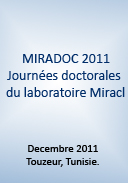 Date de création : 19 Décembre 2012MIRADOC 2011 : Journées doctorales du laboratoire Miracl. Décembre 2011. Touzeur , Tunisie
Date de création : 19 Décembre 2012MIRADOC 2011 : Journées doctorales du laboratoire Miracl. Décembre 2011. Touzeur , Tunisie -
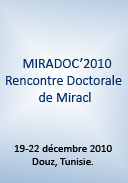 Date de création : 19 Décembre 2012MIRADOC’2010, Rencontre Doctorale de Miracl Date : 19-22 décembre 2010. Lieu: Douz , Tunisie
Date de création : 19 Décembre 2012MIRADOC’2010, Rencontre Doctorale de Miracl Date : 19-22 décembre 2010. Lieu: Douz , Tunisie -
 Date de création : 19 Décembre 2012Les 2éme Journées sur les Réseaux Bayésiens et leurs Applications Date et lieu : octobre 2011, Sfax, Tunisie. Abstract The Bayesian Networks are graphical models that are easy to interpret and update. These models are useful if the knowledge is uncertain, but they lack some means to express ambiguity. To face this problem, we propose Fuzzy Evidence in Bayesian Networks and combine the Fuzzy Logic and Bayesian Network. This has allowed to benefit from mutual advantages of these two approaches, and to overcome the problem of data and observation ambiguity. This paper proposes an inference algorithm which uses the Bayesian Network and Fuzzy Logic reliability. This solution has been implemented, tested and evaluated in comparison with the existing methods.
Date de création : 19 Décembre 2012Les 2éme Journées sur les Réseaux Bayésiens et leurs Applications Date et lieu : octobre 2011, Sfax, Tunisie. Abstract The Bayesian Networks are graphical models that are easy to interpret and update. These models are useful if the knowledge is uncertain, but they lack some means to express ambiguity. To face this problem, we propose Fuzzy Evidence in Bayesian Networks and combine the Fuzzy Logic and Bayesian Network. This has allowed to benefit from mutual advantages of these two approaches, and to overcome the problem of data and observation ambiguity. This paper proposes an inference algorithm which uses the Bayesian Network and Fuzzy Logic reliability. This solution has been implemented, tested and evaluated in comparison with the existing methods.
-
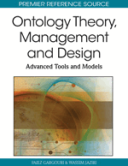 Faiez Gargouri, Wassim Jaziri Ontology Theory, Management and Design: Advanced Tools and Models ». IGI Global. ISBN-978-1-61520- 859-3. Mars 2010. Description Ontologies and formal representations of knowledge are extremely powerful tools for modeling and managing large applications in several domains ranging from knowledge engineering, to data mining, to the semantic web. Ontology Theory, Management and Design: Advanced Tools and Models, explores the wide range of applications for ontologies, while providing a complete view of the both the theory behind the design and the problems posed by the practical development and use of ontologies. This reference presents an in-depth and forward looking analysis of current research, illustrating the importance of this field and pointing toward to the future of knowledge engineering, management and information technology.
Faiez Gargouri, Wassim Jaziri Ontology Theory, Management and Design: Advanced Tools and Models ». IGI Global. ISBN-978-1-61520- 859-3. Mars 2010. Description Ontologies and formal representations of knowledge are extremely powerful tools for modeling and managing large applications in several domains ranging from knowledge engineering, to data mining, to the semantic web. Ontology Theory, Management and Design: Advanced Tools and Models, explores the wide range of applications for ontologies, while providing a complete view of the both the theory behind the design and the problems posed by the practical development and use of ontologies. This reference presents an in-depth and forward looking analysis of current research, illustrating the importance of this field and pointing toward to the future of knowledge engineering, management and information technology. -
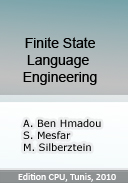 Titre : Finite State Language Engineering Autheurs : BEN HAMADOU A., MESFAR S., SILBERZTEIN M. ISBN : 978-9973-37602-2 Livre, Edition CPU, Tunis, 2010
Titre : Finite State Language Engineering Autheurs : BEN HAMADOU A., MESFAR S., SILBERZTEIN M. ISBN : 978-9973-37602-2 Livre, Edition CPU, Tunis, 2010 -
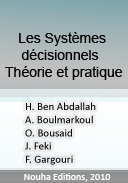 Titre : Les Systèmes décisionnels : Théorie et pratique Autheurs : BEN-ABDALLAH H., BOULMARKOUL A., BOUSSAID O., FEKI J., GARGOURI F. ISBN : 789973990020. Nombre des pages: 130 pages Livre, Nouha Editions, 2010.
Titre : Les Systèmes décisionnels : Théorie et pratique Autheurs : BEN-ABDALLAH H., BOULMARKOUL A., BOUSSAID O., FEKI J., GARGOURI F. ISBN : 789973990020. Nombre des pages: 130 pages Livre, Nouha Editions, 2010.

